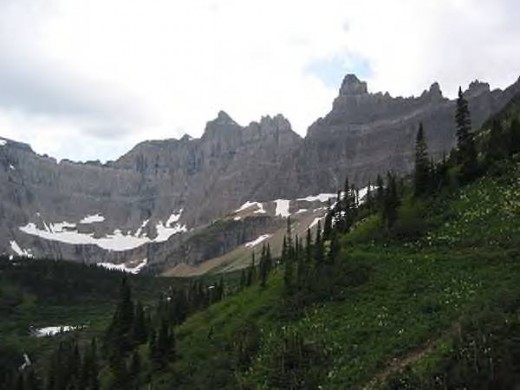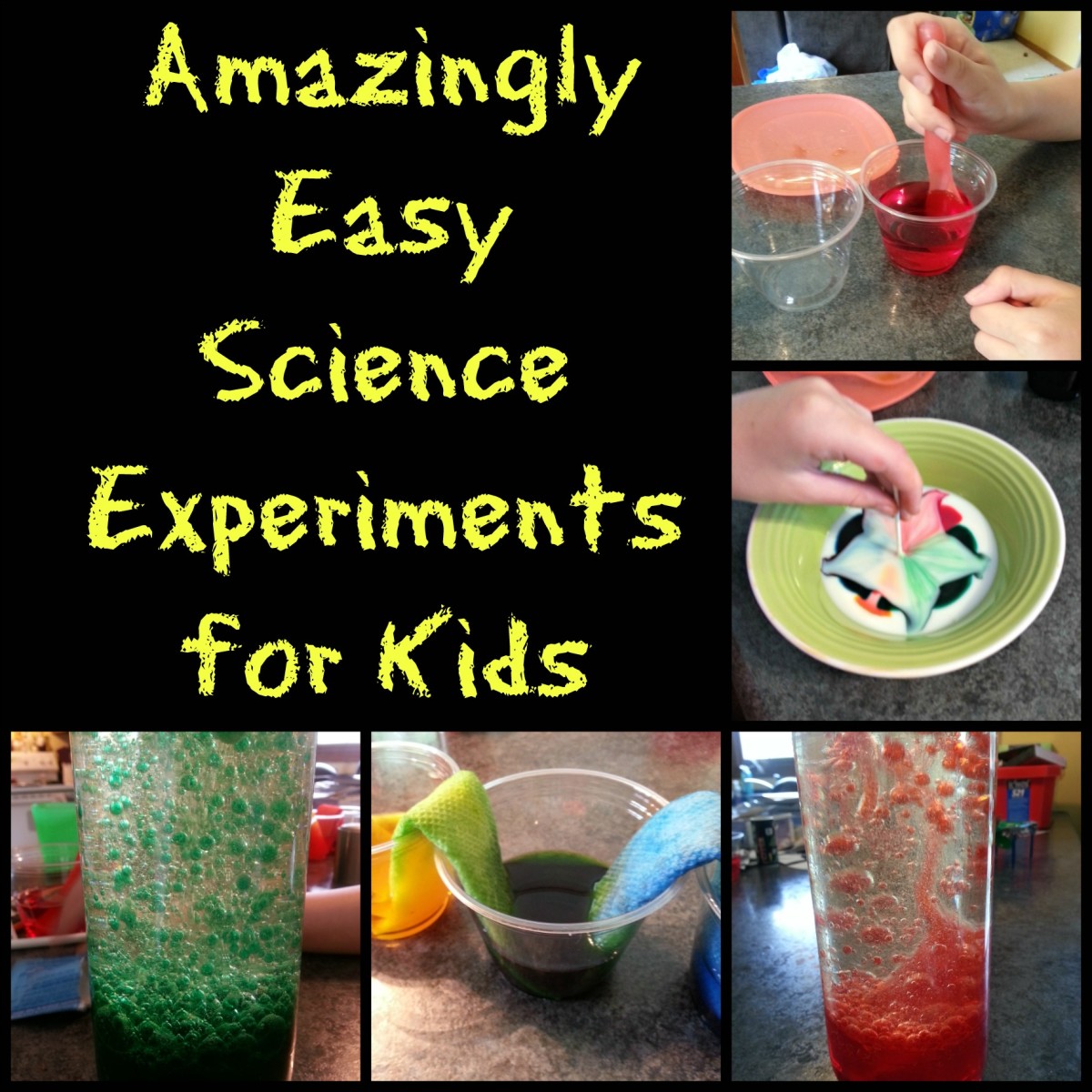Earth Science Fair Projects for Kids

Earth Science Fair Projects - Introduction
Welcome to the Earth Science Fair Projects hubpage. Here you will find a great collection of Earth Science science fair projects that you can complete or use as your inspiration. Each module will provide you with ideas for a specific type of Earth Science project, tips for expanding on the ideas and topics that you can use for your own science fair projects.
Salt Water Experiments - Science Fair Projects
Salt water experiments science fair projects offer you a lot of choices when it comes to science projects. Basic projects can examine the components of salt water, intermediate projects can compare the properties of salt water to the properties of fresh water and advanced projects can find ways to utilize the special properties of salt water to solve a current problem. Fortunately, salt water vs. fresh water science fair projects can be formatted for just about any level of project that you are interested in.
The first step in designing salt water experiments science fair projects is to decide on a topic. One very interesting topic that you can focus your on is thethermodynamic properties of salt water and fresh water. This project is just one of many different types of thermodynamics science fair projects that you can design. In this project you would determine whether fresh water or salt water retains heat better.
The second step in designing salt water experiments science fair projects is to design your experiment. Before you can design your experiment, however, you will need to come up with a hypothesis to test. For example, your hypothesis could be "salt water retains heat better than fresh water." Your experiment design would then need to prove or disprove your hypothesis statement using measurable data. For example, you can set up two different water storage tanks, one containing fresh water and one containing salt water. You can then make periodic observations about the temperature of each tank to see which water source loses heat faster.
Step three is to collect data on the heat retention properties of each of your water sources. To do this properly you will need to make scheduled observations. For example, you can collect temperature readings on both tanks every five, ten, fifteen or thirty minutes. You have a couple of options when it comes to recording your data. Your first option is to simply record the data in a notebook. If you use this method of data collection then you will want to make sure you label each reading, or set up some sort of table to ensure you assign each reading to the correct experiment and reading number. Your second option is to enter your data directly into a spreadsheet. Spreadsheets are the more efficient option because you can analyze the data that you enter using tools that come with the spreadsheet program.
The fourth step in creating your science fair project is to organize, present and analyze your data. To start with you need to organize your data so that you can work with it. Entering your data into a spreadsheet or into tables is a good place to start. You can then apply graphing and statistical analysis techniques to your data to identify relationships between your freshwater data and your salt water data. Once you have identified the relationships you will next need to present your findings in a visual way so that the science fair judges can evaluate your project. At this phase you don't want to draw any conclusions. You just want to example your data.
The final step for your project is going to be to draw your conclusions. Each conclusion that you write down needs to relate back to your hypothesis. This is the mark of a great science fair project.
15 Minute Science Fair Projects for Natural Resources
15 minute science fair project for natural resources can be a godsend when it comes to meeting last minute science class deadlines. These projects not only introduce you to important science concepts through easy earth science experiments, but they also are quick to do. Below you will find five options for quick and easy science fair projects that deal with our natural resources.
The first option that you have for 15 minute science fair projects for natural resources is to look at timber resources. Timber is used for building, making paper and for a variety of other tasks. In this quick experiment you will use the Internet to find out how much timber is harvested each year. Then compare this amount to the number of trees that are replanted each year. Is there a deficit or an excess of trees?
Another option that you have for 15 minute science fair projects for natural resources is to complete a project on mineral resources. Mineral resources include things like quartz, which is used for computer chips and time pieces. A quick project that you can complete is to search your school yard for rock samples. Then identify what types of minerals are found in your samples. Determine if these minerals are local, native or contaminants.
The third option that you have for earth science experiments that deal with natural resources is to look at gravel resources. Gravel is basically small rocks that are loosely collected together. Gravel is used for construction projects, like road building, as well as for landscaping. Create a list of all the uses gravel has, and then determine how much gravel the U.S. uses each year.
The fourth option that you have for a quick science fair project is to look at fossil fuels. Your experiment can examine local fossil fuels or foreign fossil fuel beds. To complete a quick project on this topic you will want to determine why fossil fuels are abundant in certain areas of the world. What geological history does the area have that allowed it to produce fossil fuels.
Your final option is to look at renewable resources. Renewable resources, include wood, but can also include things like renewable energy sources like solar and wind power. Survey your city and determine what renewable resources it has in abundance. How do you think that your community will utilize these resources as fossil fuels dwindle? Use your imagination to find interesting ways to experiment with renewable resources.
Chemistry science fair experiments uncover the differences between inorganics and organics...
Before trying organic vs. inorganic science projects you first need to understand the difference between organic and inorganic. Organic simply means that the object is alive or was alive at some point, and inorganic means that it was never alive. An example of an organic object is a person. An example of in organic object is a rock, and yes fossils count as an inorganic object because all the living tissues and cells have been replaced by minerals.
The first organic vs. inorganic science projects that you can work with are science experiments that explore cell structure. These science projects are designed for organisms. You can experiment with either plant or animal cells. Some cell experiments include examining the components of a cell and comparing the difference between plant and animal cells.
The second organic vs. inorganic science projects that you can experiment with will look at molecular structure. For example, you can compare the molecular differences between inorganic and organic molecules. In these chemistry science fair experiments you will want to look at the structure of the molecule, especially in regards to it ability to link with other molecules.
If you are interested in engineering then good organic vs. inorganic science projects that you can complete will take the molecular structural data collected from the above experiment and apply it to building material selection. For example, you can explore which makes a better building material, organic materials or inorganic materials. You can also explore which building materials work better in seismically active areas and which work better in extreme temperature environments based on their molecular structure and its flexibility.
All science fair projects require background research and brainstorming. If you are interested in organic or inorganic science experiments then you will need to research your topic and explore pre-existing science projects. Once you are familiarized with the background information you will be in a better position to select a topic and to develop a workable hypothesis for your science fair project.
Science Fair Projects with Shampoo...
The first science fair projects with shampoo that you can do look at how shampoo works. You can design experiments that explore what chemical properties or reactions make shampoo lather and what chemical properties or reactions help shampoo to get your hair clean. After you complete these basic chemistry science fair experiments you will be ready to move on to more advanced products.
Other science fair projects with shampoo that you can do deal with the chemical makeup of shampoo. For example, you can explore the pH level of different shampoos to see if that impacts the shampoo's ability to lather or clean your hair. You can also look at the specific ingredients that different shampoos contain and then examine the chemical properties of these ingredients to determine why they were selected, or to determine if they add any value to the shampoo product itself.
If you are interested in developing more advanced chemistry science fair projects then you can look at science experiments that use shampoo for non-conventional purposes. For example, shampoo can be used at disaster sites to purify water for drinking. This is done by applying a small amount of shampoo containing either cetrimide or polyquatermium-10 to a gallon of water. This water is swirled around to activate the shampoo. The water is then strained through newspaper that is two sheets thick.
When developing your shampoo science fair projects you need to take science project ideas, like the ones mentioned above and put your own twist on it. For example, you can take the water purification science project mentioned above and see if it is capable of removing different types of toxins like petroleum residues from water. You could also develop chemistry science fair projects that compare the water purification results from the previous experiment to high tech water purification processes to see which one is better.
Developing science fair projects that feature shampoo isn't difficult. However, they do require some work. To prepare yourself for the challenges of conducting a science fair project with this focus you will first want to research shampoo and the chemical properties of common ingredients. Also, when designing your experiment remember to create a control test that will give you baseline data to compare your test results to. Water is a good control test subject for shampoo products.
Earth science experiments that examine water filtration systems...
Carbon filter science fair experiments examine how water can be purified using carbon particles. These earth science fair projects can examine the process, the materials used or they can examine how the artificial process compares to the natural water purification processes. This is a great topic for young scientists that are interested in environmentalism.
How do carbon filters clean aquarium water? This is a practical hypothesis that will be easy to test with carbon filter science fair projects. To answer this hypothesis question you will need to examine the chemical properties of carbon, you will need to look at the physical filtration processes and you will need to look at the chemical filtration processes that occur inside a carbon based filtration system designed for aquariums.
How do carbon filters produce potable water? This is another very practical hypothesis to test with carbon filter science fair projects. To test this hypothesis you will need to design an experiment that looks at both the chemical and physical filtration processes that occur in a commercial carbon filtration system. If you have one of these systems at home, take them apart and examine how the water is filtered as it passes into each chamber of your water filtration system.
If you are interested in more advanced earth science experiments then consider comparing the effectiveness of carbon filters to that of biological filters. Make sure you explain what each is better suited for and which one is the best for treating drinking water. Take into consideration the original water source and what contaminants it might contain.
Another comparison project you can complete is to compare the effectiveness of carbon filtration systems to natural filtration systems. To complete this project you will need to compare samples of water purified by carbon filters to those taken from natural springs. Which produces cleaner water? Which is a healthier source of water and why?
The final project idea that you can work with is to examine how the use of carbon filtration systems impacts the environment. This is one of the most complex projects that you can work on. It will require you to think outside the box and to utilize a variety of data collection techniques. This project has the potential to be a science fair winner, so think about making this project your own by modifying it.
Tips for Finding Topics for Earth Science Fair Projects
The topic of your earth science fair project is going to affect the quality of your project. In fact, it impacts every aspect of your project from its hypothesis to how interesting the final presentation is. If you are interested in creating a great science fair project, you first need to select a topic that will support a winning science fair project.
The first step in finding a suitable topic for your science fair project is to examine topics that interest you, the more interesting you find the topic the more engaged you will be in the development of your project. The second step is to narrow down your topic choices by eliminating topics that are limited in their scope or that are either too advanced or too basic for you to work with. Finally, you will want to select your final topic based on your ability to come up with a unique angle on that topic for your project.
If you still have not been able to come up with a topic for your earth science fair project then go hiking. As you hike look at the world around you. The soil, the stratification of the rocks in the hillside and even the weather around you are all a part of earth science.
ground-breaking research on carbon nanotubes ...
Teacher's Guide - Science Fair Projects
In the 3rd grade students cross the threshold that sits between science observers and active young scientists. This is the grade when students learn about scientific inquiry and about the scientific method. If you are a teacher then this is the year that you will first give your students the chance to enter the school’s science fair.
Hypothesis
One of the first concepts that you will need to introduce to your students is the concept of the hypothesis. You may want to ease your way into this subject by first talking about science project questions, topics and themes. You can then cover what a hypothesis is, what its function is in the scientific inquiry and how it is used to shape a science fair project.
Variables
Variable is another science concept that you will need to introduce your 3rd graders to. A variable is a component of your hypothesis that has a relationship to another variable. One variable will be manipulated and the other will not be manipulated. The variable that is manipulated is called the independent variable and the variable that is not manipulated is the dependent variable. The dependent variable is the variable that is measured or observed when collecting data.
Experiments
When teaching your students about experiments you will want to stress the importance of only testing one relationship at a time in each experiment. For example, if you are trying to determine if the type of metal used to create a wire impacts its resistance to corrosion when placed in salt water you will only want to test the relationship between corrosion rates of metal wires in salt water. If you want to test other corrosion catalysts your students will need to develop specific hypotheses for each catalyst and a specific experiment for each new hypothesis.
Teacher’s Guide and Lesson Plans
As a teacher you need to plan out your lessons in advance. If you are thinking about teaching a module on science fair projects then go to Teacher’s Guide – Science Fair Projects. Here you will find lesson plans, ideas and project ideas.
Earth Science Innovation
Earth science is a subject that does not deal with just rocks and minerals. It is a subject that deals with a lot of complex and integrated processes. Keep this in mind when trying to develop an innovative earth science project topic.
Earth Science Resources
- Earth Science Australia
For people with an interest in earth science. This is not a links page, most resources are on site with a great emphasis on images and animations. - ClassZone
- Earth science - Wikipedia, the free encyclopedia








